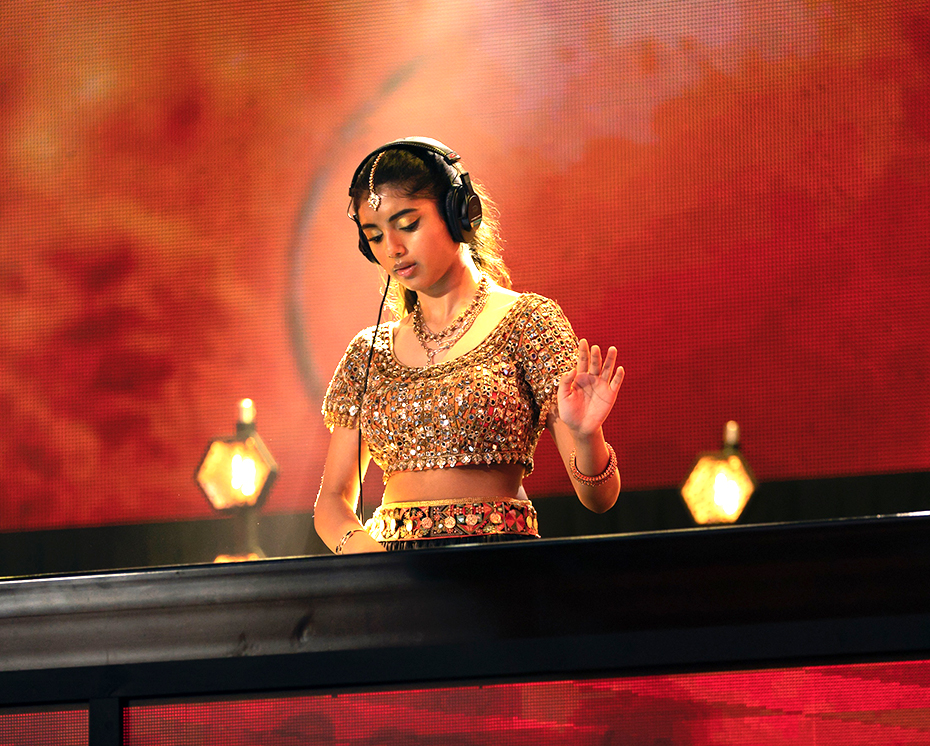By Kai Curry
Northwest Asian Weekly

Rhea (Avantika) competes in a DJ contest with a synthesis of Indian and western music. (Courtesy of the Disney Channel)
Disney Channel’s TV movie, SPIN, releasing Aug. 13, is remarkable for what it doesn’t have, as much as for what it does. The layered production showcases not only a storyline where the girl learns to follow her passion, but also, a world where we all actually get along, mostly.
The title is a peak at the plot, where we meet Rhea, an Indian American high schooler who, after her mother’s death, takes it upon herself to help her dad in the family restaurant while following a responsible path of STEM at school. She enjoys both but shuts off a creative side of her until romantic interest Max, a white exchange student, by way of a DJ contest, ignites a buried passion in her that turns out to be not for him but for mixing music.
Here’s something the movie doesn’t have. Racism. Avantika, who plays Rhea, calls SPIN “aspirational” because it shows us a world of how it could be. Conditioned by the incidents of hate that take place what seems constantly in our real world, I kept waiting for Max’s mom, for instance, to walk into the room and say something horrible. She never did. Nobody ever did. “The point of the film is to represent this ideal universe where people are respectful of each other’s cultures and we as Indians—or whatever community you come from—are respectful of our own culture.” That’s why, Avantika says, SPIN does not include any negativity related to Rhea’s race. Rhea’s conflict is inside of her, and it’s not about that.
“I think her being Indian is something that’s very established within her and the people around her.” To Avantika, this sort of film is as important as those that feature racism, so audiences can see what it might be like to not make a big deal out of a person’s color or ethnicity.
As Rhea discovers her musical affinity, she learns to combine her own culture and the things she loves, such as the sound of the ocean or the tinkling of bells on the ankles of traditional Indian clothing, with contemporary techno and dance music. Everywhere in the movie is this synthesis of two worlds, in contrast to what we often see as a struggle, which is not present in SPIN. Aryan Simhadri, who plays Rhea’s younger brother, Rohan, found this absence refreshing.
“I know there’s this very common, overplayed stereotype, especially with South Asians, where it’s, ‘I’m Indian, but I’m also American. Now, I have to choose between my heritages. Oh, woe is me!’ In Simhadri’s view, one of the big takeaways of SPIN is that “you don’t always have to have all of ‘A’ or all of ‘B’—you can have a little bit of both [and] fuse them together.”
Aryan also enjoyed that Rhea and Rohan get along. Even though they are different, they support each other, and there is no sibling rivalry. Rohan, who is not as much in his father’s line of sight as Rhea, is more comfortable connecting to his passion, which for him is coming up with new menu items for the restaurant—but his distracted father, Arvind (Abhay Deol), brushes off his son’s innovations until, through his own journey in the movie, he comes to realize that his children have other needs. But before you start to think that Arvind must be the kind of overbearing conservative immigrant Indian dad, he’s not. He’s just busy and honestly thinks that his daughter enjoys working at the restaurant, because she keeps telling him that she does!
Here’s where one of the most delightful aspects of SPIN comes in, which is both a have and a don’t have. What we have is Rhea’s grandmother, Asha (Meera Syal), a Bollywood enthusiast who does dance numbers for restaurant customers and who is, hands down, the most supportive grandmother and mother-in-law in the history of the universe.
What we don’t have is this grandmother insisting, for instance, that Rhea follow a traditional career or marriage path; or her widowed son-in-law, either; and although she wishes for a new life for Arvind, she is perfectly happy when he and her granddaughter bring home non-Indian paramours. It’s Asha who helps Rhea connect to her love of music, and who helps the father better connect to his children. (She might also help Rhea cheat a little bit on being grounded so that she can attend the DJ contest.)
What we also don’t have is a movie that’s too kidsy or panders too much to adults—it’s just a good story. Avantika told the Weekly that, while she was sure there would be many families that would balk at their child wanting to pursue a hobby as a DJ, the movie helps audiences envision a world where that’s okay.
“I think a lot of parents would be scared, and rightfully so. At the same time, it’s very possible to do what Rhea’s doing—which is having an academic career as well as pursuing DJ’ing. It’s possible to do both and one fuels the other. Her coding helps her master the technological aspects of DJ’ing and music opens up the pathways in her brain that will help her code more interesting things.”
At a time in the world where everyone seems divided, SPIN helps the audience realize all the “both’s” we can have in life. We can cherish and nurture all sides of our heritages and all sides of our personalities. We can have Indian music fused with western music. We can have interests in science and the arts. We can have people that are different, and also get along.
Kai can be reached at info@nwasianweekly.com.



